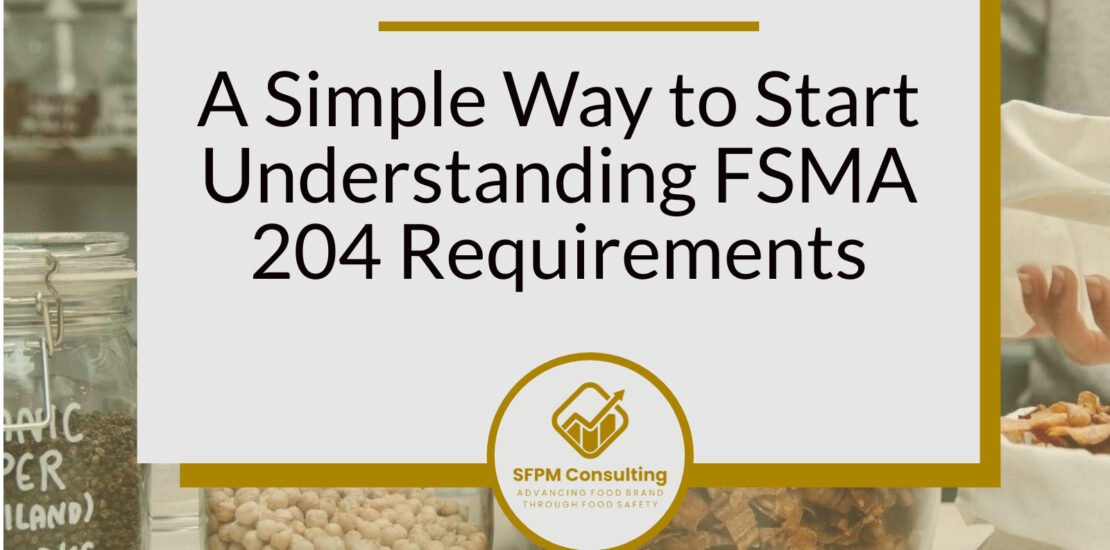- May 9, 2023
- Posted by: mva
- Category: Food Safety

The FDA final rule on Requirements for Additional Traceability Records for Certain Foods (Food Traceability Final Rule) establishes traceability record-keeping requirements beyond existing regulations for persons who manufacture, process, pack, or hold foods included on the Food Traceability List (FTL).
US FSMA 204 rule is one of the latest FSMA requirements associated with food traceability from farm to fork. The scope and extensive data collection and recording requirements can be daunting for someone new. This blog post reviews key terms associated with US FSMA 204 requirements. You must understand these key terms to comply with US FSMA 204 requirements fully:
- Key Data Elements (KDE)
- Critical Tracking Events (CTE)
- Traceability Lot Code (TLC)
In summary, this rule requires all manufacturers, processors, packers and holding facilities associated with foods listed on the Food Traceability List (FTL) to maintain relevant KDE and CTE data and provide electronic sortable spreadsheet data within 24 hours, unless exempted.
This rule applies to domestic facilities and foreign suppliers of food consumed in the US.
Understanding Your FSMA 204 Obligation
There are two first steps for identifying your US FSMA 204 requirements.
- Check the food traceability list. The food traceability list includes most fresh produce, fresh and frozen seafood, and high-risk food such as cheeses.
- Check for exemptions
- You may be able to obtain a partial or full exemption depending on the products you are working on.
Understanding the relationship between KDE and (CTE)
According to the FDA Final Rule, CTE is the event where key data elements (KDE) information. Examples of Critical Tracking Events may include harvesting, cooling, packing, shipping, receiving, transformation etc.
In the guidance below, you will find the information associated with CTE that must be documented.
See CTE and KDE and Traceability Plan
Identify and Assigning Traceability Lot Code (TLC) based on CDE and KTE
According to the FDA Final Rule, the traceability lot code is any unique lot identifier assigned by the firms responsible for the steps.
First, assigning traceability lot code to applicable food on the Food Traceability List
- Packing raw produce other than food obtained from the fishing vessel, receiving food from a fishing vessel or transforming food -You must assign lot code
- Receiving FTL from a non-assigned FTL product -You must assign lot code (unless you are a food retailer or restaurant)
- Do not assign a new TLC when conducting other activities, such as shipping
Second, link the traceability lot code with each critical tracking event that follows through the supply chain.
The best way to understand what you need exactly is to refer to the reference guidance below:
- Supply Chain for Produce Example
- Supply Chain for Seafood Example
- Supply Chain for Soft Cheese Example
- CTE and KTE and Traceability Plan
Traceability Plan
Additional requirements for a traceability plan include ensuring the use of farm maps for produce and aquaculture farms.
See CTE and KTE and Traceability Plan
Record Keeping as an additional requirement
As always, record-keeping is required to ensure that food traceability can be traced. However, in this case, unless exempted, the US FSMA rule requires all relevant CTE, KTE and TLC information must be made available as an electronic sortable spreadsheet.
Some of you must think, what if we do this manually? It is time to think about how you can fulfil this requirement. Can you convert them from paper copies to sortable electronic copies within 24 hours?
Traceability Software
With the amount of data required for this traceability requirement, the traceability chain can be extensive depending on where you are on the supply chain pathway.
Food traceability software can help with traceability lot code assignment and meet the digitalization record for electronic sortable spreadsheet within 24 hours. Paper traceability may soon end, for what we know, as this rule continues to be adopted.
The good news:
US FSMA 204 requirements compliance is not due until Jan 20, 2026, but it will be here before we know it. In addition, the FTL can be expanded as deemed necessary- check the FTL list regularly to ensure you do not miss out on the compliance requirements.
Read more at US FSMA Final Rule for Additional Traceability Requirements
Need help with US FSMA 204 rule?
Contact us, and we will get you started with understanding and setting you up for success.
